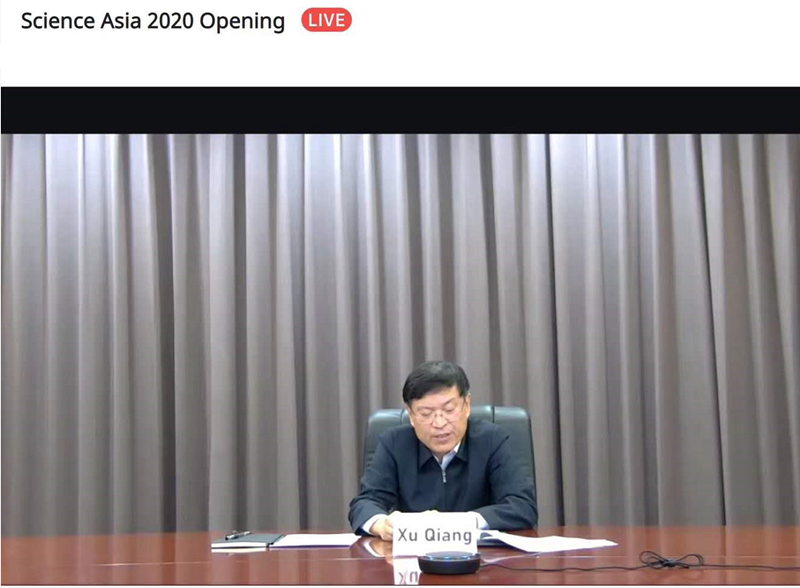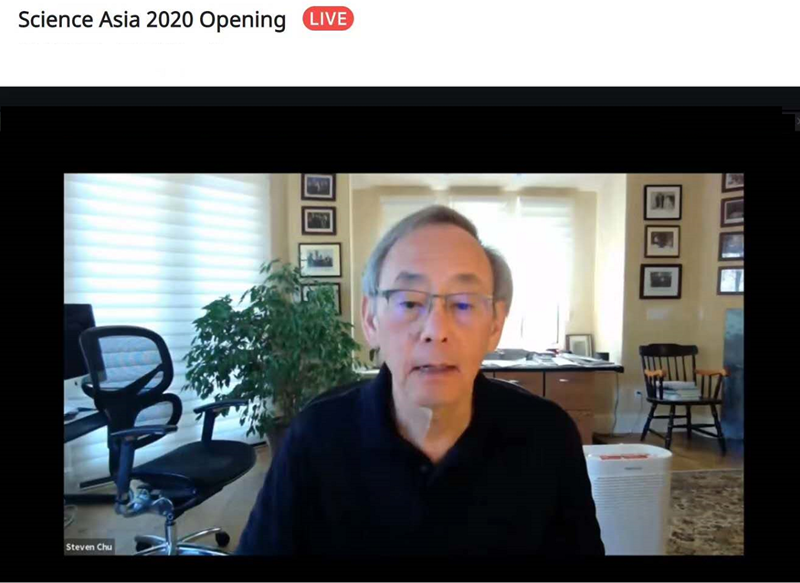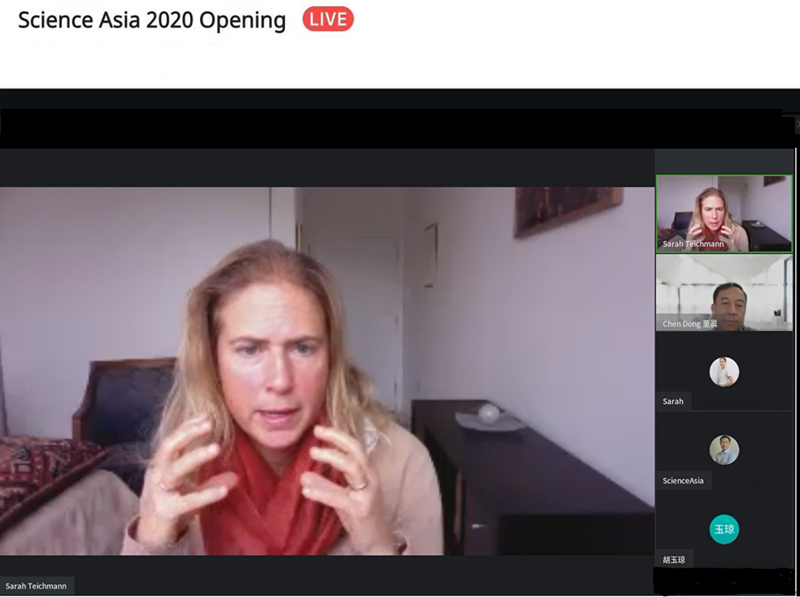Exploring a 'multi-omics' approach to the immune system
Science Asia Forum 2020: Multi-omics Approach to the Immune System was held from Oct 19 to 23, 2020.
Over 1,000 scholars attended the meeting online, with the sessions attracting more than 200,000 views during the five days.
Both established leaders and younger investigators presented their latest findings to the audience, and the forum enabled listeners to interact with speakers via virtual chat, Q&A sessions and panel discussions.
Recordings of the talks and Q&A sessions are still accessible for registrants after the meeting on Science Asia's official website (http://www.scienceasia.cn) .
Xu Qiang, director of the Beijing Municipal Science & Technology Commission, said at the opening ceremony that the Science Asia Conference is part of the Beijing International Academic Exchange Season.

Xu Qiang, director of the Beijing Municipal Science & Technology Commission, delivers a speech at the opening ceremony. [Photo provided by Zhongguancun Administrative Committee]
Xu pointed out that Beijing has achieved great results in building itself into China’s innovation center of science and technology.
The health and medicine industry in Beijing is booming. Since the beginning of 2020, the city has developed three innovative drugs and several innovative products in response to the pandemic, Xu noted.
Xu added that Beijing will set up more national laboratories, plus new research and development agencies for the medical and health industries. The city will also focus on cultivating world-class talents, and developing research-oriented hospitals, in a bid to enhance independent innovation and accelerate the clinical trials of drugs.
Nearly 30 outstanding scientists, scholars, executives and elites from academia and famous academic journals shared their insights and latest findings in immune responses to infection, cancer, new technologies, autoimmunity and regulatory networks.
At the opening ceremony, Steven Chu, chairman of the AAAS Board of Directors, delivered a keynote speech titled Reflections on Scientific Collaborations. Sarah Teichmann, head of the Cellular Genetics Program at the Wellcome Sanger Institute, Cambridge, announced a report entitled Cell Atlas Technologies & Deciphering Thymic Development.

Steven Chu, chairman of the AAAS Board of Directors, makes a keynote speech at the forum. [Photo provided by Zhongguancun Administrative Committee]

Sarah Teichmann, head of the Cellular Genetics Program at the Wellcome Sanger Institute, Cambridge, announces a report at the forum. [Photo provided by Zhongguancun Administrative Committee]
On the subject of the COVID-19 virus, Dennis Burton, chairman and professor at the department of immunology and microbiology at the Scripps Research Institute, talked about neutralizing antibodies to SARS-CoV-2 and COVID-19 vaccine design. Chen Dong, professor and director of the Institute for Immunology at Tsinghua University, spoke about 'adaptive immunity' to COVID-19.
Regarding autoimmunity, regulatory networks and cancer, Hu Xiaoyu, a professor from Tsinghua University, gave a lecture on “Defining monocyte heterogeneity in health and in rheumatoid arthritis patients”. Later, Chris Goodnow, executive director of the Garvan Institute of Medical Research, discussed “Rogue clones of self-reactive B cells with lymphoma driver mutations: tracing somatic evolution of autoimmune disease by multi-omic single cell analysis”.
Professor Zhang from Peking University also shared his thoughts on "Pan-Cancer Single Cell Analysis of Tumor-infiltrating Immune Cells", and Crystal Mackall, Ernest and Amelia Gallo Family professor of Pediatrics and Medicine at Stanford University, talked about "Next Generation CAR-T Cells to Overcome Resistance".
Shruti Naik, assistant professor at New York University School of Medicine, explored "Immune-epithelial stem cell crosstalk in health and disease". And Florent Ginhoux, adjunct visiting associate professor at the Shanghai Immunology Institute, Jiao Tong University, gave a speech entitled "Macrophage Biology: From Development to Functions".
Özlem Türeci, chief medical officer and co-founder of BioNTech, talked about "Using liposomally formulated RNA vaccines in the treatment of cancer". Katy Rezvani, Sally Cooper Murray Chair in Cancer Research at the MD Anderson Cancer Center, shared her findings on "CAR NK cells: a drive to the future of cell therapy".
On the application of new technologies in treating infectious diseases, Peter Openshaw from the National Heart and Lung Institute of the Faculty of Medicine at Imperial College London, gave a report titled “Viral lung disease: an immunological failure or an immunological storm?”
Li Dali, professor of biochemistry and molecular biology and a senior investigator at the school of life sciences of East China Normal University introduced genome-editing technology for disease modeling and gene therapy. And Bruno Correia, a tenure track assistant professor at École Polytechnique Fédérale de Lausanne (EPFL), Switzerland, shared his insights on "Expanding the landscape of functional proteins by computational design".
Darrell Irvine, professor of the departments of biological engineering and materials science and engineering of Massachusetts Institute of Technology, talked about controlling timing and location in new vaccine technologies for cancer and infectious disease. Rahul Satija, a core faculty member at the New York Genome Center (NYGC), discussed integrative analysis of multi-modal single-cell data.
Dong Chen, who also chaired the meeting, said in his closing remarks that he really enjoyed the talks and hoped that the audience felt the same. He then congratulated Science/AAAS, Zhongguancun Life Science Park and Tsing-Innovation Ecosystem on the successful meeting, and thanked the Beijing Municipal Science & Technology Commission for its guidance.
Science Asia Forum 2020 was jointly organized by Science/AAAS, Zhongguancun Life Science Park and Tsing-Innovation Ecosystem, under the guidance of the Beijing Municipal Science & Technology Commission.
